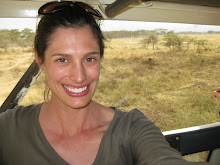Last night while having dinner, my host mom, who is an instructor at a teacher training college, announced that one of her students had died—he had drowned while swimming in a local river. He went under in a part of the river that was especially deep from old gold mining drilling. I'm guessing there was some sort of undertow or current as it seemed like he knew how to swim. It wasn’t clear to me from the story.
A friend tried to save him, but realized that he was getting pulled under too, and swam back. Some brave villagers by the river also tried to help, to no avail. Unfortunately, one was drunk, and ended up drowning too.
I was surprised to hear it, but not nearly as so as I would have been two months ago when I got to Kenya. Since I’ve been here, I’ve heard about someone dying or having something awful befall them about every fortnight. It seems like death is more a part of life here.
For example, in February, my boss informed us at a staff meeting that her brother had just died of HIV. She is my age, and is one of the sweetest, smartest and most honest people I’ve met in Kenya. However, it sounds like her older brother was not so good-hearted: after he was infected, he neglected to inform his wife, because he was too cowardly to tell her he had been unfaithful. She became infected and also died a few years ago.
Kate, another intern, works in a Catholic orphanage called “Divine Providence” two days a week, and in a local hospital lab the other three. I ran into her while walking home the other day and inquired about her day. She responded: “It was fine, but we lost one of the babies. When I came in this morning, it wasn’t there. Sister Pamela was vague about how it died; I wouldn’t be surprised if it was some sort of accident. There was already another baby in its crib though—some street boys found it brought it in.” Despite the dark subject, Kate reported this all in the relatively matter-of-fact way she has, which always amuses me.
In Early March, Stellah, a college student interning here, told me that her uncle had stepped on a sharp stick while barefoot, and three days later had died from tetanus. By the time he realized he had an infection, it was too late. She would be away for a few days for the funeral.
Again, Kate, upon joining me for drinks in late March: “Sorry I’m late – something always happens at the hospital right before 5 and I can’t leave. These guys brought in a friend of theirs in because he couldn’t see or hear. He was just convulsing on the ground. They said he drank a bad batch of the local brew [which I’ve heard can contain awful things like embalming fluid.] I had to stay because they wanted to run a malaria test. Hah! It’s definitely not malaria. He’s probably going to be blind and have nerve damage the rest of his life, if he makes it at all.”
I communicate all this not to be depressing, but just because it stuck me how infrequently I come across death at home, and how commonplace and a part of daily life it’s become for me here.
The only person who’s died recently from something unavoidable is my FSD Program Coordinator’s father, who just passed away from prostate cancer at 93. Which is pretty impressive considering that the life expectancy here is something like 49. Hundreds of people came to the funeral. Neighbors, friends and family from out-of-town camped out under the stars on the family compound and mourned for a whole week. Luhyas, the main ethnic group/tribe in Kakamega, bury their loved ones on the family's compound, so that’s where Peter’s dad was laid to rest—at home where he’d lived for decades. His grave was behind his mud hut and in between his two wives’ huts, decorated with metallic streamers.
If you want to hear more about African funerals, my friend Emily wrote a pretty fascinating account of one when she was in Zambia. Scroll to the entry marked 10th May, 2005.
Cheers, be grateful, and watch out for those rusty nails,
Katy
16 years ago




